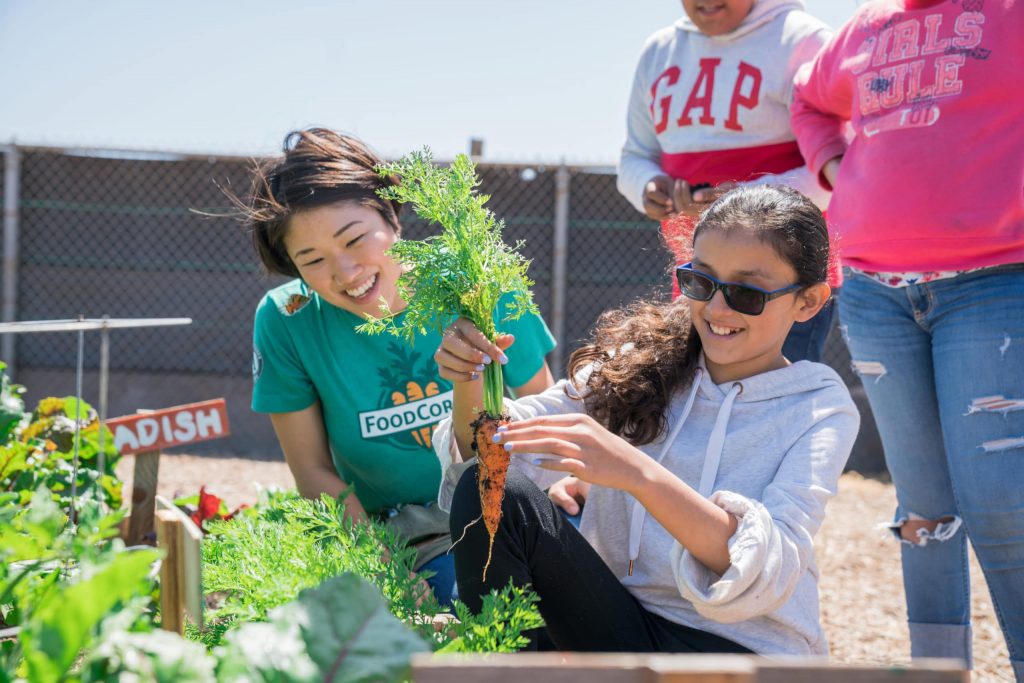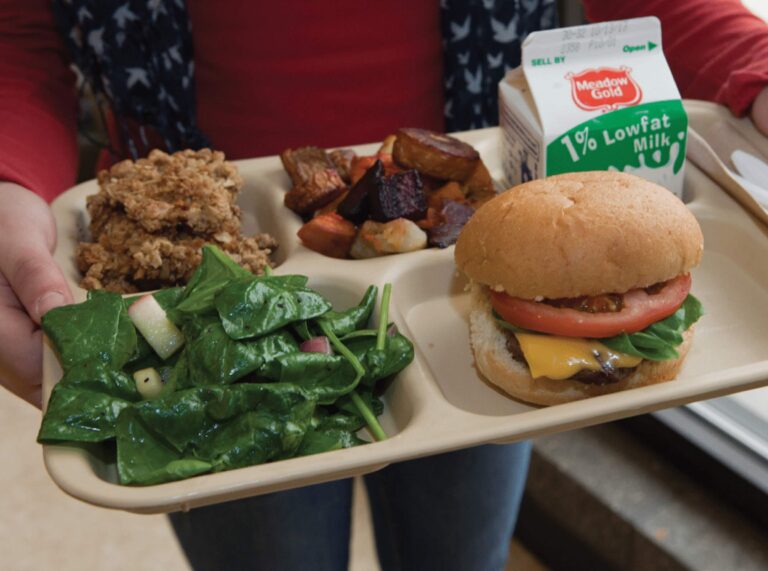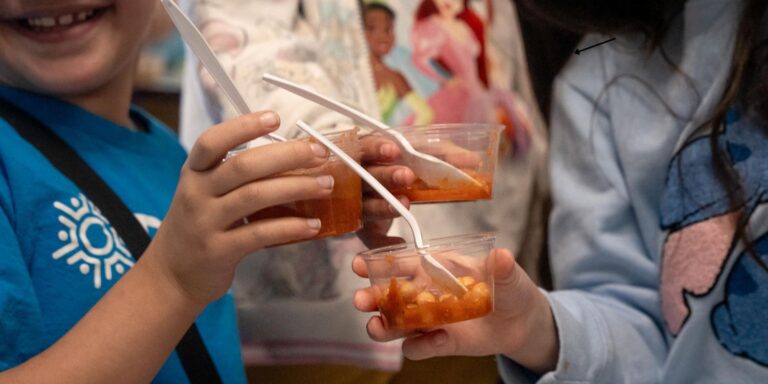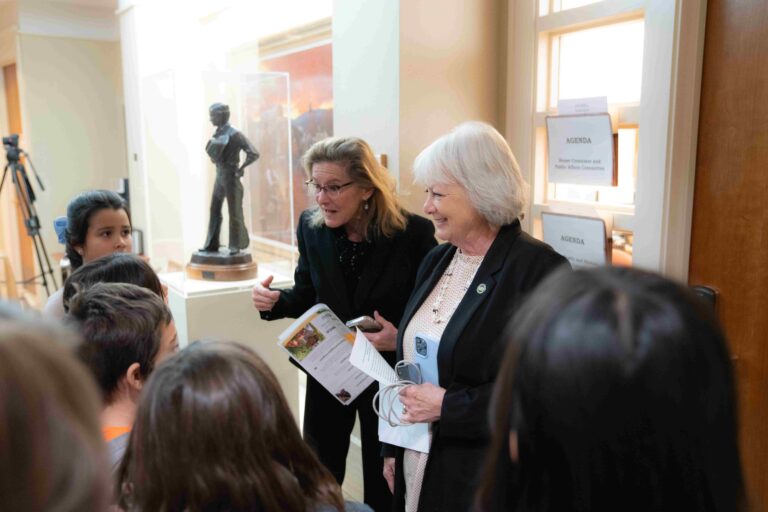Why We Need The Food and Nutrition Education in Schools Act
Food educators support schoolwide health efforts through hands-on learning, school gardens, taste-testing, and farm-to-school practices.
Join our corps! Applications for 2026-2027 are now open. Apply by March 30.
Food educators support schoolwide health efforts through hands-on learning, school gardens, taste-testing, and farm-to-school practices.

Throughout the pandemic, particularly in the face of school closures, school gardens have served as safe spaces for children to gather, grow, and play together in the face of traumatic times. At one school in Cedarville, Arkansas, FoodCorps AmeriCorps service member Tara McDaniel and her site supervisor, Jennifer Nolan, created a schedule for families to safely access the school garden and harvest fresh produce even while schools were closed.
“School gardens have been a great symbol of resilience for communities during this uncertain time,” McDaniel said. “Giving students and their families an opportunity to come into the garden and harvest something for dinner reminds them that the school, their teachers, and their friends are still around; we’re all just connecting in a different way than before.”
Even after the pandemic, cooking and gardening lessons will continue to be a place for healing, where kids can experience joy, culture, and community through food. Congress is considering a bill that would take a step towards making this vision a reality for every student across the country.
The Food and Nutrition Education in Schools Act is a bipartisan bill that would support placing food and nutrition educators like Tara in more schools.
In February 2020, with support from FoodCorps, Senators Cory Booker (D-NJ) and John Cornyn (R-TX) introduced the Food and Nutrition Education in Schools Act. This week, the bill was reintroduced by Sens. Booker and Cornyn.
This bill would establish a pilot program to provide schools with food educators, who use hands-on lessons to teach about food and nutrition. Based on our more than ten years of experience and academic research, we know that food education strengthens kids’ connections to healthy food. Food educators support schoolwide health efforts through hands-on learning, school gardens, taste-testing, and farm-to-school practices.
The 2020 bill was sidetracked due to the pandemic, as legislators shifted their priorities toward economic recovery and other pandemic relief efforts. Also put on hold was child nutrition reauthorization (also known as CNR), the process by which laws governing child nutrition are routinely updated. It has now been ten years since the last CNR, and we are long overdue for meaningful updates to child nutrition policies.
Well-designed, evidence-based, hands-on lessons about food and nutrition can transform a child’s relationship to healthy food, setting them up to thrive at school and beyond. And in the aftermath of COVID-19, which jeopardized many families’ food security and pulled kids from in-person learning, these connections are especially important.
One FoodCorps service member in California, Olivia Hardley, began teaching nutrition and cooking lessons over Zoom when schools shut down. Through a combination of providing bulk ingredients to students and conducting virtual family cooking nights, Hardley and her supervisor were able to continue connecting with students through healthy meals, providing an important touchpoint for food education during an otherwise tumultuous year.
“Some kids who literally have no kitchen experience whatsoever” showed up on Zoom to cook with their families, Hardley told FoodCorps over the winter. And after a kale caesar salad demonstration in January, one student told her, “Miss Olivia, can I tell you something? I never eat salad, but I’m going to eat this one!”
Food education is also a crucial tool for helping students build confidence and grow their connections to their communities.
Jake Batchelor, who serves in Arkansas, reported that an applesauce-making class with students provided an opportunity for their kitchen skills to blossom.
“We all got to use an apple corer and practice our knife safety skills. Some students had already helped their parents prepare meals and demonstrated their own safe knife technique,” Batchelor said. “I was happy to see that students who already felt confident could be proud, and that they could help other students.”
Another way food and nutrition educators support students is by broadening their exposure to nutritious, locally grown food. It can take 10 or more tries of a new food before a kid learns to like it, but food educators help to make the process more kid-friendly.
Maria Karas, a FoodCorps service member in Connecticut, told FoodCorps about hosting a taste test of kale with her students. “While we were walking around handing the samples out one student asked what kale was,” Karas said. “When I explained to her that kale is a kind of vegetable, she said ‘Ew! I hate vegetables!’ But when we got to her table and it was time to vote if she loved it, liked it, or tried it, she voted ‘Loved it!’”
The connections kids make to food in their childhood are likely to last a lifetime, whether it’s confidence in the kitchen or the bravery to believe that vegetables are tasty, too. Food and nutrition educators help strengthen those connections, making nutritious, joyful food experiences a foundational part of kids’ education.
We’re hopeful that the Food and Nutrition Education in Schools Act will be included in the next CNR. This means we’ll be advocating for a number of food education and farm to school bills to pass together as part of a child nutrition package.
We’ll keep our Action Center updated with opportunities to raise your voice for these bills as part of CNR. In the meantime, make sure you’re signed up for FoodCorps action alerts so you’ll be the first to know when it’s time to contact your legislators.
FoodCorps is a non-partisan, non-profit organization. FoodCorps staff and FoodCorps AmeriCorps members may not participate in any partisan or seemingly partisan activities during work time charged to a Corporation for National and Community Service funded grant or while earning AmeriCorps service hours. No federal funds were used to prepare or distribute advocacy actions.

3 Reasons We Need School Meals for All

Mindful Tasting: Eating with All 5 Senses

Our 2025 Child Nutrition Policy Year in Review